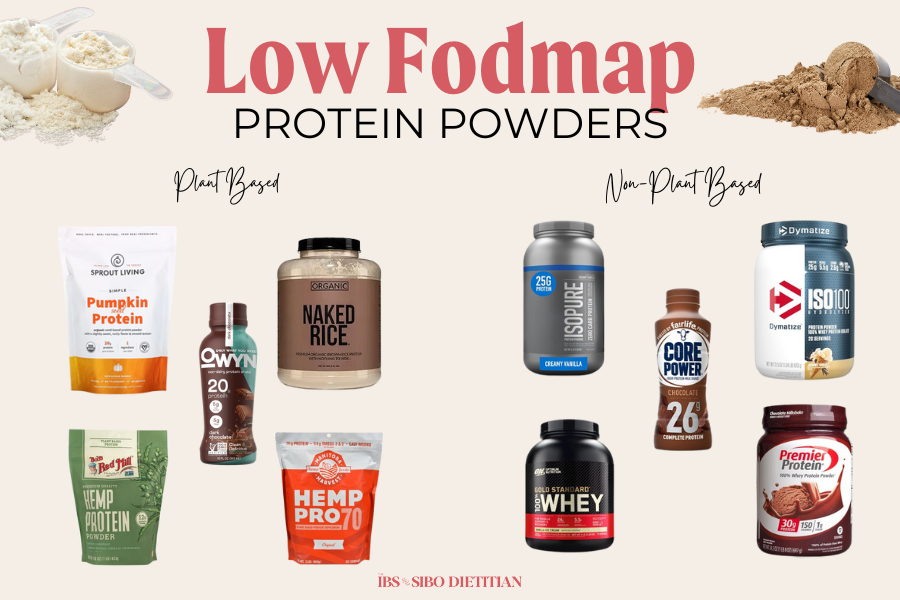If you are new to the Low FODMAP diet, you are probably realizing that there are many nuances that can make choosing things like low fodmap protein powders very difficult. In this article, we’ll dig into low FODMAP protein powder, exploring their benefits, considerations, and some of my choices in each category.
Understanding the Low FODMAP Diet
The low FODMAP diet aims to alleviate symptoms of irritable bowel syndrome (IBS) and other gastrointestinal disorders by reducing the consumption of foods high in FODMAPs. FODMAPS are carbohydrates that are poorly absorbed in the small intestine. This can lead to symptoms like bloating, gas, abdominal pain, and altered bowel habits.
The Low FODMAP diet is a three phase elimination diet; the elimination phase, reintroduction phase, and maintenance phase. It is designed to understand what your trigger foods may be that are unique to you without having to blindly remove foods from the diet.
Benefits of Low FODMAP Protein Powders:
Easily Digestible Meal Option: By opting for low FODMAP protein powders, individuals with sensitive guts can minimize the risk of triggering symptoms associated with high FODMAP foods. It is an easy way to still receive adequate nutrients intakes even when eating seems daunting. Low fodmap protein powders can be a go-to option when your appetite is low as it takes less effort to digest.
Easy Option for Protein with Meals: Protein is an essential macronutrient crucial for muscle repair, immune function, and overall health. It is also important in regulating blood sugars and keeping you full. Low FODMAP protein powders offer a convenient way to meet protein requirements without compromising digestive wellness.
Versatility: Low FODMAP protein powders can be incorporated into a variety of recipes, including smoothies, baked goods, and savory dishes, providing flexibility in meal planning
Considerations When Choosing Low FODMAP Protein Powders:
Protein Source: Opt for protein powders derived from low FODMAP sources such as whey isolate, rice, pea, hemp, or egg white protein.
Ingredients: It’s essential to scrutinize the ingredient list to ensure that the protein powder does not contain high FODMAP ingredients. Some of these ingredients include inulin, chicory root, honey, or high-lactose dairy products.
Flavors and Additives: Some protein powders may contain artificial sweeteners, flavors, or additives that could potentially trigger symptoms in sensitive individuals. Choose products with minimal ingredients and natural flavorings whenever possible.
Which Protein Powders are Low FODMAP?

This post may contain affiliate links.
Whey Protein Isolate:
Whey protein stems from cow’s dairy, constituting the liquid portion of milk that separates during cheese production. It’s a complete, high-quality protein containing all nine essential amino acids necessary for human dietary needs. There are various types of whey protein powder, including whey protein concentrate, whey protein isolate, and whey protein hydrolysate. Each type with different levels of protein concentration and processing methods.
It is important to note though that not all the whey protein powders are low FODMAP. In contrast to whey protein concentrate and hydrolysate, whey protein isolate undergoes further processing to remove most of the lactose. As a result, whey protein isolate typically contains very low levels of lactose, making it suitable for many individuals who are sensitive to lactose.
Here are a few of my favorites:
Optimum Nutrition Gold Standard
Rice Protein Powder:
Rice protein powder derived from brown or white rice, is low in FODMAPs and provides a complete amino acid profile. It’s an excellent option for individuals with dairy or soy allergies or for those following a vegetarian or vegan lifestyle.
Here is one of my favorites:
Pea Protein Powder:
Pea protien powder is made from yellow peas, pea protein powder is easily digestible and typically well-tolerated by most individuals following a low FODMAP diet. It’s also rich in branched-chain amino acids (BCAAs) which support muscle recovery and growth. The Monash University initially stated that pea protein is FODMAP free, but was since restested with mixed results. Rule of thumb is that if tolerated previously, no need to remove it from your diet and can still be considered a low FODMAP protein powder.
Here are some of my favorites:
Hemp Protein Powder:
Hemp seeds provide the foundation for hemp protein powder, offering a balanced ratio of essential fatty acids, fiber, and protein. This sustainable option boasts a nutty flavor profile. Experts consider the omega-3 to omega-6 fatty acid ratio in hemp protein beneficial for heart health, immune function, and reducing inflammation. Additionally, hemp protein powder is recognized as a complete protein, delivering all nine essential amino acids that the body cannot produce on it’s own.
Here are a couple of my favorites:
Pumpkin Seed Powder:
Pumpkin seed protein powder is a complete source of plant-based protein, containing all nine essential amino acids. It provides an excellent option for vegetarians, vegans, and individuals looking to increase their protein intake without relying on animal products. Compared to some other plant-based protein sources, pumpkin seed protein powder is gentle on the digestive system and generally well-tolerated. It contains notable amounts of magnesium, iron, zinc, and antioxidants, which support various aspects of health including immune function, bone health, and energy production.
Here is my favorite:
Sprout Living Pumpkin Seed Powder
Egg White Protein Powder:
Egg white protein powder is another low FODMAP protein powder option. It provides a complete protein source without the inclusion of dairy or soy. In addition to protein, egg white protein powder contains essential vitamins and minerals such as vitamin B12, riboflavin, and selenium. These nutrients play vital roles in energy metabolism, hormone regulation, immune function, and overall health.
Here is my favorite:
Bottom Line
Low FODMAP protein powders offer a convenient and digestively friendly way to incorporate essential nutrients into the diet. By choosing products made from low FODMAP sources and free from potential trigger ingredients, individuals can support their digestive wellness while meeting their protein needs effectively.
Disclaimer: this is for educational purposes only. It is not intended to replace or substitute for professional medical advice for IBS or SIBO or any other health condition. Always consult with your healthcare provider for individualized recommendations.
More Resources for you to Enjoy
When is it More than “Just IBS”









